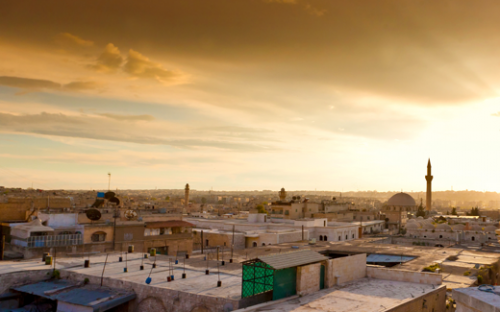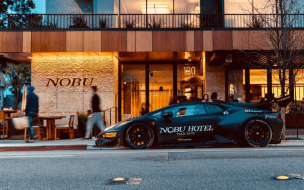The founder of Virgin, one of the biggest brands that has over 360 different companies under its banner, become an entrepreneur when he was a teenager. He may not have studied an MBA, but his circumstances were shared by many business school start-ups today.
He launched his first business, a magazine called Student, during the Vietnam War when he was 15. He aspired to end the conflict and become an entrepreneur out of need, not greed.
Sir Richard told a live-stream audience, part of Global Entrepreneurship Week, that the best business ideas are somewhat humble.
“It was a dreadful war and young people all over the world wanted to rise up and stop it,” he said. "We had to become entrepreneurs in order to ensure the business survived.
"Often the best businesses come when people have the idea and want to make a difference. In the process they end up trying to make sure more money comes in so they can survive.”
There is an increasing trend in MBAs shunning traditional jobs in favor of entrepreneurial start-ups.
But there are also those that seek to use entrepreneurship to improve the world. Social impact and entrepreneurship are often merged and business schools provide the perfect platform for MBAs to develop their world-changing ideas.
One such MBA, Bharath Maguluri, completed the full-time program at EMLYON Business School earlier this year and has already begun work on restoring the education system in his home, India.
Fixing Education In India
Bharath is now spearheading the financial and academic management of 10 schools in Southern India with his father. K12 Techno Services Pvt. Ltd is responsible for over 150,000 students.
He graduated from Ohio State University and then began an MBA at EMLYON in France. Bharath returned with fresh ideas to bolster his family's education business.
Education is a problem in India and today, just 58 per cent of children complete primary school. Of those, only 10 per cent go on to study at college. Literacy rates are as low as 74 per cent and in the countryside, schools are often of a poor quality.
Bharath wants to use entrepreneurship to change that. "I had a passion for education and when I came back, when I had got my experience in international markets, we expanded the company rapidly,” he told BusinessBecause.
He wants to set up his own online education platform for the next generation of India, and help address some of the many problems associated with the education sector.
"The low-class schools are for people with mid-level income or below,” he said. “In the countryside in India, it’s very difficult (for children) and even though the Government provides free schools, there aren’t good facilities, or good enough infrastructure.
"Many people can’t go to private schools because they would have to travel up to a hundred kilometers a day.
“They (parents) are compromising on the quality of education and sending students to Government schools, which are very bad. Every year the Government is planning to close down more schools."
The solution? Teach children from home. An EMLYON MBA gave Bharath the skills to use entrepreneurship to fix India's flagging education system.
"The way I approach a problem is completely different now," he said. "I would look at how to solve problems only from my experience in the education business. Now, what I think of is how to grow, how to get more people in the business; I am constantly looking at a different angle.”
The Arab Spring: Syrian Civil War
Amin Kattan is from the worn-torn Arab state of Syria. He left the country because he felt he had no future. Eventually, he ended up studying an MBA at EMLYON and has plans to rebuild his homeland once the conflict ends.
The Syrian civil war has left more than 100,000 dead and millions displaced. Amin has lost two cousins and an uncle to the conflict. “I had no freedom in Syria," he said. "At that point and until recently the main dream of Syrian youth was to leave because the situation was so tough."
But it was there that Amin’s passion for business was ignited. His entrepreneurial flair was set off by the famous Aleppo soap - made in the country for over 2,000 years.
He was approached by a business partner and the pair developed an idea to market Syria’s famous soap in Switzerland.
They wanted to mix the country’s tradition with a modern marketing campaign and although the startup didn’t flourish, Amin was inspired to switch career paths.
"I would like to help Syria rebuild after the war ends and I believe the MBA changed my vision towards Syria and the solution,” he said.
“I believe in entrepreneurship as a way to rebuild the country and society; giving jobs to people prevents them from taking weapons and becoming thugs.
"We have hundreds of thousands of injured people, and if you give them jobs you save them from despair, hunger and death. As soon as the situation becomes stable I think entrepreneurship will do this.”
Civil War In Sudan
Husameldin Elnasri is the first Sudanese MBA to study an MBA at Lancaster University Management School. Sudan has been ravaged by civil wars for over 60 years and Husameldin left his wife and two young daughters behind to further a business career and bring prosperity to his homeland.
After demonstrating extraordinary achievements in the face of adversity, he won The Independent’s MBA student of the year award. But his MBA was abruptly put on hold when Sudan, split into two countries – North and South - returned to fighting a civil war that has so far cost the lives of over 1.5 million people.
Husameldin’s motivation in business is to help the people of Sudan, those living in poverty, with the threat of war looming over their heads, to have a better quality of life.
The MBA at Lancaster was a platform for him to use those skills to change Sudan for the better. "I aspire to be an African agriculture business expert," he said.
"I think we would be able to provide a lot of solutions because we have to take the fact that most Africans are actually farmers and see that this is the area that we really need to address.”
Husameldin landed a job with DAL Group last year. The company is the largest and most diversified conglomerate in Sudan and Husameldin is a Senior Project Manager, tasked with expanding their agriculture strategy across the country.
He says that he would “definitely not” have got the job had he not studied an MBA at Lancaster, and that it provided him with the soft skills and experience needed.
His motivation is to help others succeed through the agriculture industry, and in-turn fix the many social and political problems in Sudan. He is just one of many MBAs that seek to create real change through business leadership and entrepreneurship.
Business Schools have been helping MBAs create start-ups in greater numbers than ever.
Sir Richard founded his company on the basis of similar problems of conflict, and if b-school graduates can acheive half the success that he has, they will be well on their way to changing the world.
Virgin's founder feels the best ideas are those that will create solutions to the world's problems. Entrepreneurship is used for a great many services and not all of them are so sincere.
But what is clear is that these three MBA entrepreneurs are changing the world - for the better.
RECAPTHA :
6b
04
08
2b








